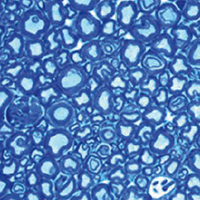Effect of unacylated ghrelin on peripheral nerve regeneration

Accepted: 13 August 2021
HTML: 10
All claims expressed in this article are solely those of the authors and do not necessarily represent those of their affiliated organizations, or those of the publisher, the editors and the reviewers. Any product that may be evaluated in this article or claim that may be made by its manufacturer is not guaranteed or endorsed by the publisher.
Authors
Ghrelin is a circulating peptide hormone released by enteroendocrine cells of the gastrointestinal tract as two forms, acylated and unacylated. Acylated ghrelin (AG) binds to the growth hormone secretagogue receptor 1a (GHSR1a), thus stimulating food intake, growth hormone release, and gastrointestinal motility. Conversely, unacylated GHR (UnAG), through binding to a yet unidentified receptor, protects the skeletal muscle from atrophy, stimulates muscle regeneration, and protects cardiomyocytes from ischemic damage. Recently, interest about ghrelin has raised also among neuroscientists because of its effect on the nervous system, especially the stimulation of neurogenesis in spinal cord, brain stem, and hippocampus. However, few information is still available about its effectiveness on peripheral nerve regeneration. To partially fill this gap, the aim of this study was to assess the effect of UnAG on peripheral nerve regeneration after median nerve crush injury and after nerve transection immediately repaired by means of an end-to-end suture. To this end, we exploited FVB1 Myh6/Ghrl transgenic mice in which overexpression of the ghrelin gene (Ghrl) results in selective up-regulation of circulating UnAG levels, but not of AG. Regeneration was assessed by both functional evaluation (grasping test) and morphometrical analysis of regenerated myelinated axons. Results obtained lead to conclude that UnAG could have a role in development of peripheral nerves and during more severe lesions.
How to Cite

This work is licensed under a Creative Commons Attribution-NonCommercial 4.0 International License.
PAGEPress has chosen to apply the Creative Commons Attribution NonCommercial 4.0 International License (CC BY-NC 4.0) to all manuscripts to be published.

 https://doi.org/10.4081/ejh.2021.3287
https://doi.org/10.4081/ejh.2021.3287






